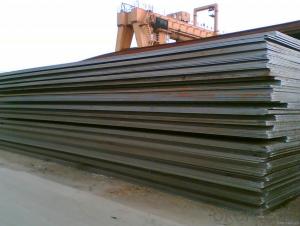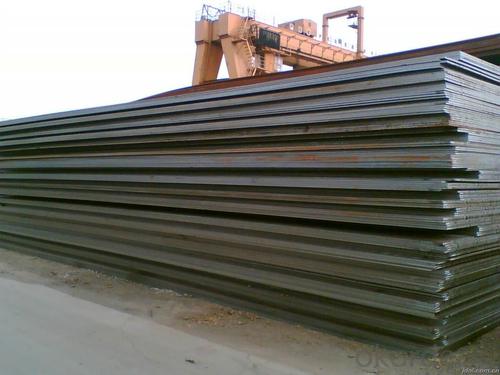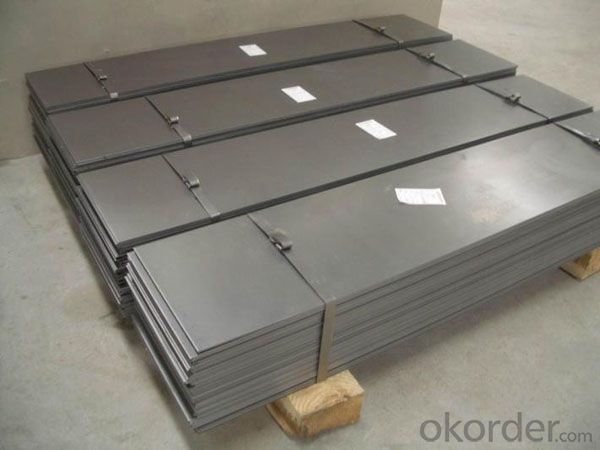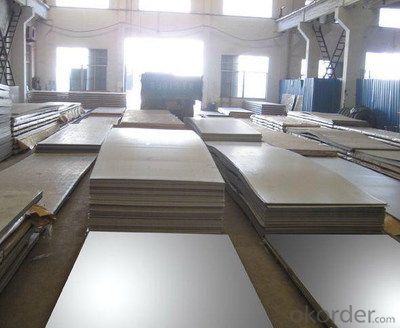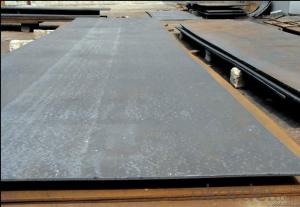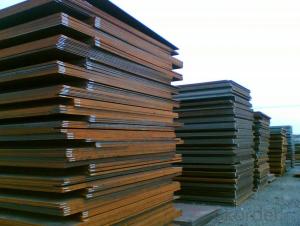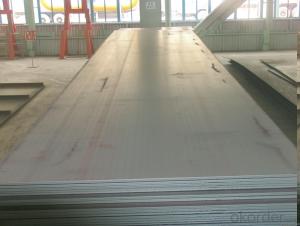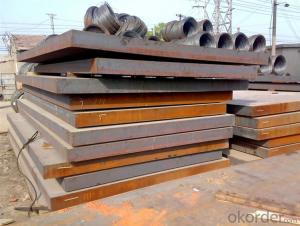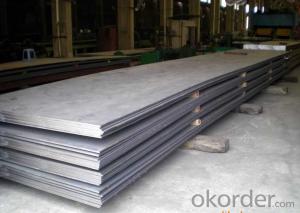Special Steel D2/SKD11 High Carbon Steel Plate
- Loading Port:
- China main port
- Payment Terms:
- TT OR LC
- Min Order Qty:
- 25 m.t.
- Supply Capability:
- 10000 m.t./month
OKorder Service Pledge
OKorder Financial Service
You Might Also Like
Specification
Chemical Composition(%)
| Country | Standard | C | Si | Mn | Cr | Mo | V | S | P | Other |
| China(GB) | Cr12Mo1V1 | 1.40-1.60 | ≤0.60 | ≤0.60 | 11.0-13.0 | 0.70-1.20 | ≤1.10 | ≤0.030 | ≤0.030 | Co≤1.00 |
| USA(ASTM) | D2 | 1.40-1.60 | 0.30-0.50 | 0.30-0.50 | 11.0-13.0 | 0.70-1.20 | 0.8 | ≤0.025 | ≤0.025 | Co:0.60 |
| Germany(DIN) | 1.2379 | 1.50-1.60 | 0.10-0.40 | 0.15-0.45 | 11.5-12.5 | 0.60-0.80 | 0.90-1.10 | ≤0.030 | ≤0.030 | - |
| Japan(JIS) | SKD11 | 1.40-1.60 | ≤0.40 | ≤0.60 | 11.0-13.0 | 0.80-1.20 | 0.20-0.50 | - | - | Ni≤0.50 |
Available Size
| Rolled flat steel | 12-90mm×205-610mm×L |
| Forged flat steel | 100-300mm×400-600mm×L |
Characterstics
| 1.High hardening ability and quench-hardening performance | ||||||
| 2.High abrasive resistance | ||||||
| 3.Good oxidation resistance at elevated temperatures | ||||||
| 4.Less deformation after heat treatment |
Applications: suitable for various complicated cold working dies with high precision and long lifetime,such as punching dies,cold extrusion dies,thread rolling dies,screw plates,cold extrusion dies,and precise measuring devices


1, Your advantages?
professional products inquiry, products knowledge train (for agents), smooth goods delivery, excellent customer solution proposale
2, Test & Certificate?
SGS test is available, customer inspection before shipping is welcome, third party inspection is no problem
3, Payment Terms?
30% TT as deposit and 70% before delivery.
Irrevocable L/C at sight.
4, Trading Terms?
EXW, FOB, CIF, FFR, CNF
6, After-sale Service?
We provides the services and support you need for every step of our cooperation. We're the business partner you can trust.
For any problem, please kindly contact us at any your convenient time.
We'll reply you in our first priority within 24 hours.
- Q: How is special steel used in the aerospace manufacturing process?
- Special steel is used in the aerospace manufacturing process due to its exceptional strength, durability, and resistance to extreme temperatures. It is utilized in various components such as turbine engines, landing gear, and structural parts, ensuring the safety and reliability of aircraft. Additionally, special steel alloys are employed in critical areas where weight reduction is necessary, enhancing fuel efficiency and overall performance.
- Q: How does special steel contribute to the construction sector?
- Special steel plays a crucial role in the construction sector by offering a wide range of benefits that contribute to the overall quality, durability, and safety of structures. Firstly, special steel possesses exceptional strength and toughness, making it an ideal material for constructing high-rise buildings, bridges, and other infrastructure projects. Its high tensile strength allows for the creation of lighter and more slender structures, reducing material costs and enabling architects to design innovative and aesthetically pleasing buildings. Moreover, special steel is highly resistant to corrosion, which is particularly important in construction projects located in harsh environments, such as coastal areas or industrial zones. This resistance ensures that structures built with special steel have a longer lifespan and require less maintenance, resulting in significant cost savings over time. Additionally, its resistance to fire and extreme temperatures makes it an essential material for fire-resistant structures and critical components in buildings, ensuring the safety of occupants. Special steel also offers excellent ductility and weldability, allowing for seamless integration with other construction materials and facilitating efficient assembly processes. Its versatility enables it to be used in various structural elements, such as beams, columns, and reinforcement bars, providing stability and structural integrity to buildings, as well as improving seismic performance. Furthermore, the use of special steel in construction aligns with sustainability goals. It is a recyclable material that can be reused without compromising its properties, reducing the environmental impact of the construction sector. Furthermore, its lighter weight compared to traditional materials minimizes the carbon footprint associated with transportation and installation. In summary, special steel contributes significantly to the construction sector by providing strength, durability, fire resistance, corrosion resistance, and versatility. Its use enables the construction of safer, more cost-effective, and environmentally-friendly structures, thereby enhancing the overall quality and sustainability of the built environment.
- Q: How does special steel perform in food processing applications?
- The unique properties and benefits of special steel make it a widely used material in food processing applications. Its exceptional corrosion resistance is one of its key advantages in this industry. When exposed to corrosive substances like acids, alkalis, and salt solutions, special steel, such as stainless steel, forms a protective oxide layer on its surface, preventing corrosion and maintaining the hygiene and safety of the processed food. In addition to its corrosion resistance, special steel is highly durable and resistant to wear and tear. This is crucial in food processing equipment that undergoes rigorous and repetitive operations like cutting, grinding, and mixing. Special steel's high strength and toughness allow it to withstand these demanding applications without compromising its performance or integrity. As a result, the equipment has a longer lifespan, minimizing downtime and maintenance costs. Special steel also offers excellent heat resistance, which is essential for high-temperature food processing applications. It can withstand extreme temperatures without losing its mechanical properties, ensuring the structural integrity of the equipment and preventing any contamination risks. Furthermore, special steel is easy to clean and maintain, a critical factor in the food processing industry. Its smooth surface and non-porous nature prevent the accumulation of food particles, bacteria, and other contaminants, maintaining a high level of hygiene. Special steel is also resistant to chemical cleaning agents and can be easily sterilized, making it an ideal material for food processing equipment. To summarize, special steel's corrosion resistance, durability, heat resistance, and ease of maintenance make it an exceptional choice for food processing applications. Its properties contribute to the safety, efficiency, and longevity of the equipment, ensuring high-quality and hygienic food production.
- Q: How does special steel contribute to the defense equipment industry?
- The defense equipment industry heavily relies on special steel, which offers superior strength, durability, and performance characteristics essential for manufacturing high-quality military equipment. This type of steel is specifically engineered to meet the demanding requirements of defense applications, ensuring the safety and effectiveness of military personnel and operations. A significant contribution of special steel to the defense equipment industry lies in its ability to withstand extreme conditions and environments. Military equipment often operates in harsh conditions, including extreme temperatures, high pressures, corrosive environments, and impact forces. Special steel is designed to maintain its structural integrity and performance under these challenging conditions, providing a reliable and long-lasting solution for defense equipment. Furthermore, special steel possesses exceptional strength and toughness, making it optimal for producing armored vehicles, tanks, and military aircraft. It provides a high level of protection against ballistic threats and can endure projectile impacts and explosions. The utilization of special steel in defense equipment guarantees the safety of military personnel and enhances their survivability in combat situations. Additionally, special steel is indispensable for the production of cutting-edge weaponry and munitions. It is employed in the manufacturing of firearms, missiles, and artillery systems due to its excellent mechanical properties and ability to withstand high pressures. Special steel also enables precision engineering, ensuring the accuracy and reliability of military firearms and projectiles. Moreover, special steel contributes to the defense equipment industry by supporting technological advancements. As technology continues to evolve, the defense sector requires materials that can meet the demands of modern warfare. Special steel can be tailored and optimized to meet specific performance requirements, allowing for the development of advanced defense systems such as stealth technology, electronic warfare, and precision-guided munitions. In conclusion, special steel plays a crucial role in the defense equipment industry by providing the necessary strength, durability, and performance characteristics required for military applications. It guarantees the safety and effectiveness of defense personnel and equipment, withstands extreme conditions, facilitates the production of advanced weaponry, and supports technological advancements in the defense sector.
- Q: How is stainless steel used in the production of kitchen utensils?
- Stainless steel is commonly used in the production of kitchen utensils due to its durability, corrosion resistance, and aesthetic appeal. It is used to make various utensils such as knives, forks, spoons, pots, pans, and cooking tools. The stainless steel material ensures that these utensils can withstand frequent use, resist rust and staining, and are easy to clean, making them ideal for use in the kitchen.
- Q: What are the requirements for special steel used in battery technology?
- To ensure optimal performance and safety, special steel utilized in battery technology must fulfill several requirements. First and foremost, it is imperative that the steel exhibits high corrosion resistance. This is crucial due to the presence of corrosive electrolytes within batteries that can gradually deteriorate the steel. Special steel must possess exceptional resistance to corrosion in order to prevent any chemical reactions that may compromise the battery's integrity and lifespan. Additionally, the steel must possess good mechanical strength to withstand the internal pressures and external forces that batteries encounter during operation and handling. It should be capable of resisting deformation and maintaining its structural integrity, even under high-stress conditions. Furthermore, it is desirable for the special steel to have high thermal conductivity. This is essential for efficient heat dissipation, as overheating can diminish battery performance and potentially lead to safety hazards. Steel with excellent thermal conductivity facilitates effective heat transfer, ensuring that the battery can function within safe temperature limits. Moreover, the steel should exhibit low electrical resistivity to minimize energy losses resulting from electrical resistance. This guarantees efficient energy transfer within the battery and reduces power dissipation, ultimately enhancing overall battery efficiency. In addition, compatibility with other battery materials, such as electrodes, electrolytes, and separators, is crucial. Ensuring compatibility prevents any chemical reactions or detrimental interactions that may jeopardize the battery's performance or lifespan. Finally, in line with the growing emphasis on environmental sustainability, it is increasingly important for special steel used in batteries to be produced using environmentally friendly methods. This entails minimizing the carbon footprint and reducing the consumption of scarce resources. To summarize, special steel utilized in battery technology must possess high corrosion resistance, mechanical strength, thermal conductivity, low electrical resistivity, compatibility with other battery materials, and environmental sustainability. These attributes are necessary to ensure optimal performance and safety in batteries.
- Q: Can special steel be used in high-pressure applications?
- Indeed, high-pressure applications can utilize special steel. These steels, also referred to as alloy steels, are intentionally designed to possess improved mechanical properties, including high strength, ductility, and resistance to corrosion. These characteristics make them suitable for enduring high-pressure settings. Industries such as oil and gas, aerospace, automotive, and power generation often employ special steels due to their high-pressure applications. In the oil and gas sector, for instance, special steels are utilized in the production of high-pressure pipelines, valves, and pressure vessels that can withstand the intense pressure conditions during processes like oil drilling, transportation, and refining. The exceptional strength of special steel enables it to withstand the internal pressure exerted by fluids or gases without any deformation or failure. Additionally, its corrosion resistance ensures that the steel remains intact and undamaged even in the demanding operating conditions frequently encountered in high-pressure applications. Furthermore, special steels can be customized to meet specific requirements by adjusting their chemical composition and heat treatment processes. This customization allows the steel to exhibit even greater strength, toughness, and fatigue resistance, thereby making it an ideal choice for applications in high-pressure environments. To summarize, special steel can be utilized in high-pressure applications owing to its enhanced mechanical properties and resistance to corrosion. Its ability to endure extreme pressures makes it a dependable option for numerous industries that encounter high-pressure conditions.
- Q: What are the requirements for special steel used in industrial equipment manufacturing?
- Special steel used in industrial equipment manufacturing typically has certain requirements to ensure its suitability for use in demanding applications. Some of the key requirements for special steel in this context include: 1. High strength: Industrial equipment often operates under heavy loads, so special steel must have excellent strength properties to withstand these forces. It should have a high yield strength, tensile strength, and hardness to prevent deformation or failure. 2. Corrosion resistance: Many industrial environments are prone to corrosion due to exposure to chemicals, moisture, or extreme temperature variations. Special steel used in such applications should have good corrosion resistance to prevent degradation and ensure long-term performance. 3. Wear resistance: Industrial equipment often experiences significant wear due to friction, abrasion, or impact. Therefore, special steel should have high wear resistance to maintain its integrity and prevent premature failure. 4. Toughness and impact resistance: Equipment used in industrial settings may face sudden shocks, impacts, or vibrations. Special steel should possess good toughness and impact resistance to absorb energy and resist fracture or cracking. 5. Heat resistance: In certain industrial processes, equipment may be exposed to high temperatures or rapid temperature changes. Special steel should have good heat resistance, with the ability to retain its strength, hardness, and other mechanical properties even at elevated temperatures. 6. Machinability: Special steel used in industrial equipment manufacturing should have good machinability to facilitate the fabrication process. It should allow for easy cutting, drilling, welding, and other machining operations without excessive tool wear or damage to the material. 7. Dimensional stability: Equipment components need to maintain their shape and dimensions under different operating conditions. Special steel should exhibit dimensional stability to prevent warping, distortion, or dimensional changes that could affect the performance or assembly of the equipment. Meeting these requirements ensures that special steel used in industrial equipment manufacturing can withstand the harsh conditions, provide reliable performance, and have a long service life, ultimately contributing to the overall efficiency and productivity of industrial processes.
- Q: What is the difference between special steel and regular steel?
- Special steel refers to a specific type of steel that is designed and manufactured to possess enhanced properties compared to regular steel. These enhanced properties can include higher strength, improved corrosion resistance, better heat resistance, or increased hardness. Special steel is often used in applications where standard steel may not meet the required specifications or performance demands.
- Q: How is special steel used in the production of cutting inserts?
- The unique properties of special steel make it the ideal choice for producing cutting inserts. Cutting inserts are utilized in machining operations to shape and remove material from a workpiece. These inserts must possess the ability to endure high temperatures, resist wear and abrasion, and maintain their sharp cutting edges for extended periods. Commonly referred to as tool steel, special steel is specifically engineered to meet these requirements. It is an alloy that incorporates a variety of elements like chromium, tungsten, vanadium, and molybdenum, which enhance its mechanical properties. With its exceptional hardness, toughness, and resistance to high temperatures, special steel is a suitable material for cutting inserts. To further augment its properties, the special steel employed in manufacturing cutting inserts undergoes a series of processes, including heat treatment. This process involves subjecting the steel to specific temperatures and rapidly cooling it, resulting in increased strength and hardness. By undergoing heat treatment, the cutting inserts become capable of withstanding the extreme forces and temperatures encountered during machining operations. Moreover, special steel can be coated with materials like titanium nitride or diamond-like carbon to enhance its performance. These coatings contribute to the hardness, friction reduction, and overall wear resistance of the cutting inserts, ultimately extending their lifespan and improving efficiency. In conclusion, special steel is selected for the production of cutting inserts due to its remarkable hardness, toughness, high-temperature resistance, and wear resistance. These properties enable the cutting inserts to withstand the demanding conditions of machining operations and retain their sharp cutting edges for prolonged periods. As a result, material removal is carried out efficiently and precisely.
Send your message to us
Special Steel D2/SKD11 High Carbon Steel Plate
- Loading Port:
- China main port
- Payment Terms:
- TT OR LC
- Min Order Qty:
- 25 m.t.
- Supply Capability:
- 10000 m.t./month
OKorder Service Pledge
OKorder Financial Service
Similar products
Hot products
Hot Searches
Related keywords
